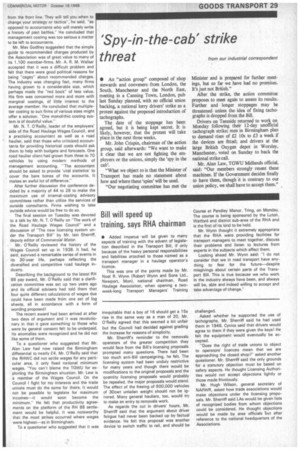'Spy-in-the-cab' strike
Page 31

If you've noticed an error in this article please click here to report it so we can fix it.
threat from our industrial correspondent
• An "action group" composed of shop stewards and conveners from London, the South, Manchester and the North East, meeting in a Canning Town, London, pub last Sunday planned, with no official union backing, a national lorry drivers' strike as a protest against the proposed introduction of tachographs.
The date of the stoppage has been agreed, but it is being kept secret. It is likely, however, that the protest will take place in the next three weeks.
Mr. John Crispin, chairman of the action group, said afterwards: "We want to make it clear that we are not fighting the employers or the unions, simply the 'spy in the cab'.
"What we object to is that the Minister of Transport has made no statement about how and where these 'spies' will be used.
"Our negotiating committee has met the Minister and is prepared for further meetings, but so far we have had no promises. It's just not British."
After the strike, the action committee proposes to meet again to assess its results. Further and longer stoppages may be threatened unless the idea of fixing tachographs is dropped from the Bill.
Drivers on Teesside returned to work on Monday following their 12-day unofficial tachograph strike; men in Birmingham plan to demand rises of £2 lOs to £3 a week if the devices are fitted; and drivers at the large British Oxygen depot in Worsley, Manchester, voted on Sunday to back the national strike call.
Mr. Alan Law, TGWU Midlands official, said: "Our members strongly resent these machines. If the Government decides finally to have them, though it is contrary to our union policy, we shall have to accept them."
























































































































